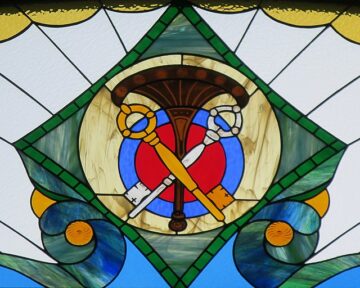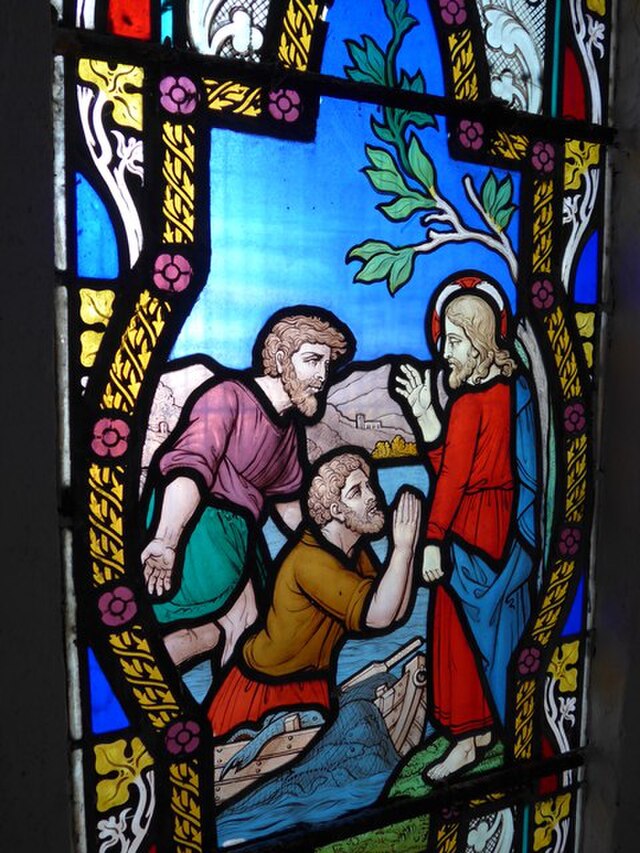Franciscan Friar Fr. Paul Gallagher reflects on the Gospel text for the Twenty-first Sunday of Ordinary Time. Have you experienced others making comments about you that revealed that they saw you in a different light than you saw yourself? What feelings arose from that experience?
The content is edited by Franciscan Sister of Christian Charity Sister Anne Marie Lom and Joe Thiel. The excerpts from the Sunday readings are prepared by Joe Thiel. To read or download the complete pdf with excerpts for your prayer, please click here Franciscan Gospel Reflection August 27 2023. Excerpts are from the Lectionary for Mass for Use in the Dioceses of the United States of America, second typical edition © 2001, 1998, 1997, 1986, 1970 Confraternity of Christian Doctrine, Inc., Washington, DC. Used with permission. All rights reserved. No portion of this text may be reproduced by any means without permission in writing from the copyright owner. Photo: St Peter Havenstreet: stained glass window (b) by Basher Eyre, CC BY-SA 2.0 <https://creativecommons.org/licenses/by-sa/2.0>, via Wikimedia Commons; Nheyob, CC BY-SA 4.0 <https://creativecommons.org/licenses/by-sa/4.0>, via Wikimedia Commons.
Matthew 16:13-20
When Jesus went into the region of Caesarea Philippi he asked his disciples, “Who do people say that the Son of Man is?” They replied, “Some say John the Baptist, others Elijah, still others Jeremiah or one of the prophets.” He said to them, “But who do you say that I am?” Simon Peter said in reply, “You are the Messiah, the Son of the living God.”
Jesus said to him in reply, “Blessed are you, Simon son of Jonah. For flesh and blood has not revealed this to you, but my heavenly Father. And so I say to you, you are Peter, and upon this rock I will build my church, and the gates of the netherworld shall not prevail against it. I will give you the keys to the kingdom of heaven. Whatever you bind on earth shall be bound in heaven; and whatever you loose on earth shall be loosed in heaven.” Then he strictly ordered his disciples to tell no one that he was the Messiah.
Background:
The gospel from last week described Jesus’ encounter with a Canaanite woman in the pagan region of Tyre and Sidon. Following their exchange, Matthew’s gospel records this next sequence of events: Jesus returns to the Jewish region and the shores of the Sea of Galilee. Great numbers of people follow him into the mountains, where he cures many. After the crowd has been with him for three days, Jesus once again tells the disciples to give them something to eat. They have only seven loaves and a few fish. Jesus has the crowd recline on the grass, and he blesses the bread and has the disciples distribute it to the crowd. Then he has them collect what is left—seven baskets full of leftovers. When the crowd is dismissed, Jesus and the disciples get into a boat and make their way to the district of Magadan where he encounters some Pharisees and Sadducees. They ask him to produce some sign from heaven. Jesus leaves them without providing what they requested. When they get to the other side of the sea, Jesus tells the disciples to be aware of the leaven of the Sadducees and Pharisees. The disciples have forgotten to bring bread for the trip, and they seem to presume Jesus is talking about the leaven for bread. Jesus makes it clear that he is speaking of the leaven of the Sadducees’ and Pharisees’ teaching. All this leads to the Gospel text for this week.
Similar to this week’s gospel from Matthew, Mark too recounts an occasion when Jesus asks the same questions that are posed here (Mark 8:27-29). In Mark’s account, Peter confesses that Jesus is the Messiah, but not that he is the “Son of the Living God.” Also, Jesus does not comment on Peter’s profession of faith, but he tells the disciples not to speak to others of what they have heard. Then Jesus speaks to them for the first time of his passion and death. Peter, hearing this for the first time, responds by taking Jesus aside and voicing some objection to what Jesus is saying. Jesus replies by telling Peter, “Get behind me Satan, you are not thinking as God does, but as human beings do” (Mark 8:33b). Mark’s account is powerful, but the reader will benefit from keeping the two accounts separate. Matthew’s account, the gospel text for today, represents a very different perspective into Jesus’ ministry, and its own invitation for our response.
It will also be helpful to be aware that people of eastern Mediterranean cultures have a very different sense of themselves than most westerners. They are “other”-orientated to the extent that they may not have a sense of who they are apart from their family or clan. From this perspective, Jesus is not quizzing his disciples to see if they know his true identity. His questions are an effort to sort out for himself who he is. While this way of thinking is very different from what many are accustomed to, there are examples of this mindset throughout the gospels. In John’s gospel, those who question Jesus’ qualifications are dissatisfied to learn that he is from Nazareth. Nathanael represents their attitude when he asks, “Can anything good come from Nazareth? (John 1:46)” In Matthew and Mark, Jesus is identified as the son of a craftsman (Matthew 13:55 and Mark 6:3). Lastly, the gospels portray an attitude that if you know one’s family, you know the person. “‘Is not his mother called Mary? And are not his brothers James and John and Simon and Judas? And are not all his sisters with us? Where then did this man get all this?’ And they took offense at Jesus. (Matthew 13:55-57)”
Hopefully, these passages help to highlight a different kind of understanding that people of Jesus’ day perceived of themselves and their identity. The more appreciation we have of the culture in which the gospels were written, the deeper the insight for ourselves and our culture.
Reflection Questions:
- Who are the people in your life who have helped you sort out some of life’s quagmires?
- Have you experienced others making comments about you that revealed that they saw you in a different light than you saw yourself? What feelings arose from that experience?
- Who are your rocks?
- If you were one of the disciples and Jesus asked you who people say he is, what would you think of Jesus asking you this? What feelings would you have at even being asked?
- How would you respond?
- In this gospel Jesus says to Peter: “Blessed are you, Simon son of Jonah. For flesh and blood has not revealed this to you, but my heavenly Father. And so I say to you, you are Peter, and upon this rock I will build my church, and the gates of the netherworld shall not prevail against it. I will give you the keys to the kingdom of heaven. Whatever you bind on earth shall be bound in heaven; and whatever you loose on earth shall be loosed in heaven.” How do you think Peter is feeling at this moment?
- Can you also hear Jesus saying something similar to you? How do you feel, considering that Jesus looks upon you with similar feelings?
- Can you take time now to talk with God about how you see God working in the world today, or how you see God working in your own life? What questions would you like to ask? Are there questions God might like to ask you?



